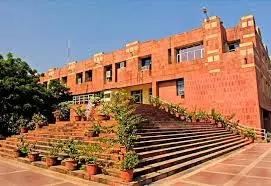JNU student union polls: Left a divided house, can ABVP capitalise?

JNU Student Union Polls 2025: Left a Divided House, Can ABVP Capitalise?
Jawaharlal Nehru University (JNU) is once again in the spotlight as its student union elections return after a five-year hiatus. With the Left front facing internal cracks and the Akhil Bharatiya Vidyarthi Parishad (ABVP) growing in visibility and outreach, this year’s poll battle could reshape campus politics in significant ways.
The Background: A Legacy of Left Dominance
JNU has long been considered a Left stronghold. Over the years, various left-leaning student bodies such as the All India Students’ Association (AISA), Students’ Federation of India (SFI), Democratic Students’ Federation (DSF), and All India Students Federation (AISF) have dominated the Jawaharlal Nehru University Students’ Union (JNUSU). Historically, they’ve united to form a united Left panel to counter right-wing forces, particularly the ABVP, which is affiliated with the Rashtriya Swayamsevak Sangh (RSS).
However, this year tells a different story.
A Fragmented Left: Signs of Strain
Unlike previous years, the Left parties have failed to form a common alliance in 2025. Internal disagreements over candidate selection, ideological posturing, and inter-party rivalry have surfaced, leading each Left organization to announce separate candidates for key posts.
This fragmentation weakens the Left’s electoral prospects significantly. In past elections, the Left’s strength lay in its unity. By dividing votes among themselves, they risk ceding political space to their main challenger – the ABVP.
Moreover, many students are expressing disillusionment with Left parties for failing to rise above factional egos at such a critical juncture. There’s growing concern that instead of offering a progressive and united alternative, the Left has succumbed to internal power struggles.
ABVP’s Opportunity: Strategic Growth and Visibility
The ABVP, which has steadily increased its footprint in various Indian universities, sees this election as a rare window to make history at JNU. Traditionally marginalized in JNU politics, the ABVP has gained ground over the past decade by framing its narrative around nationalism, security, and anti-elitism. Its student leaders often highlight issues of campus discipline, academic rigour, and inclusive representation of students from non-elite and non-metropolitan backgrounds.
This year, the ABVP has fielded candidates who reflect diversity in caste and region, tapping into the sentiment of many students who feel alienated by what they perceive as the ‘urban, elite’ nature of Left politics on campus.
Crucially, the ABVP is positioning itself not just as a right-wing alternative but as a disciplined and issue-driven force. By focusing on student welfare issues like hostel allotment, library resources, delayed MPhil and PhD admissions, and scholarship delays, it’s attempting to attract the apolitical or neutral voter base that might have otherwise backed the united Left.
The Student Voice: What Matters to JNU in 2025
Beyond ideological clashes, JNU students are facing real academic and administrative issues. The COVID-19 pandemic disrupted research timelines and academic schedules. Many students are yet to receive pending scholarships, while some MPhil and PhD programs remain understaffed or underfunded.
Students have also expressed frustration with the administration’s alleged lack of transparency and accountability. While the Left continues to blame the administration’s ‘saffronization’ agenda, critics argue that the Left has failed to propose constructive solutions beyond protest politics.
In this environment, the ABVP’s focus on concrete deliverables—like digital infrastructure, grievance redressal mechanisms, and better hostel amenities—may appeal to a new generation of voters more concerned with policy than polemics.
Electoral Math: Who Has the Edge?
With the Left vote likely to split, and ABVP maintaining a consolidated base, the upcoming election is set to be closer than ever. If ABVP manages to consolidate votes from centrist and neutral students while capitalizing on the Left’s internal divide, it could pull off an electoral upset.
However, a divided Left is not a defeated Left. Even in multiple-party contests, individual Left candidates could still win if voter turnout among Left-leaning students remains high and if some tactical coordination happens at the last minute.
What’s at Stake?
JNUSU elections have always held symbolic weight in national discourse. A win for the ABVP would not just be a political milestone—it would mark a cultural shift in one of India’s most iconic university campuses. It would also serve as a morale booster for right-wing student politics across India.
On the other hand, a win for any of the Left factions would reinforce JNU’s image as a bastion of critical thought and resistance politics, albeit now marred by internal fragmentation.
Final Thoughts
The 2025 JNUSU elections are not just about student representation—they’re about the future of ideological discourse in Indian academia. With the Left divided and the ABVP more organized than ever, this is a pivotal moment for JNU’s political landscape.
Much will depend on voter turnout, alliances in the final days, and how well each side can speak to the real needs of students beyond ideology.






